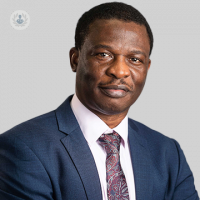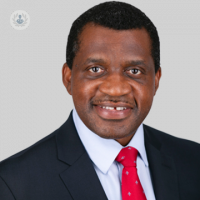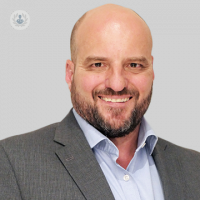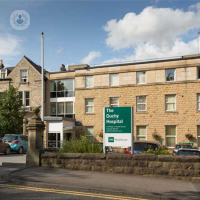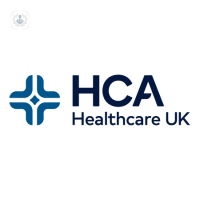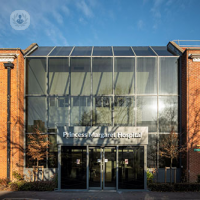What is it?
An aortic aneurysm is an abnormal, progressive and permanent dilation of part of the aorta, the largest artery in the body. The dilation of the aorta leads to its weakening over time and, sometimes, to its rupturing.
An aneurysm can affect the abdominal tract (abdominal aortic aneurysm) as well as the thorax (thoracic aortic aneurysm).

Prognosis
Aortic aneurysm is a life threatening condition: the affected aorta could suddenly rupture, or it could lead to the formation of an embolism, consequently causing a stroke or a heart attack.
What are the symptoms?
An aneurysm doesn't generally cause any symptoms until it has reached a large size, and sometimes there are no symptoms before it ruptures. In these cases, the main symptoms are breathing and swallowing problems, a change in voice pitch, back or chest pain and low blood pressure.
How is it diagnosed?
If the aneurysm isn’t big enough to rupture, it can be diagnosed with an abdominal ultrasound (in case of an abdominal aneurysm) or with an echocardiogram (in case of thoracic aneurysm). In other cases you may also require a thoracoabdominal CT scan.
What causes it?
The main causes for aneurysm are:
- hypertension
- atherosclerosis
- inflammation of the aorta
- genetic disorders of the connective tissues
Your risk of getting an aortic aneurysm increase as you get older, and are higher if you smoke.
How can it be prevented?
You can prevent getting an aortic aneurysm by avoiding smoking and by maintaining a healthy blood pressure and cholesterol levels.
How is it treated?
If the aneurysm is still small, you should periodically monitor it, treat it with medication and make sure to lead a healthy lifestyle. If it has already reached a bigger size, you may need to have open surgery (resection of the dilated area and substitution with a synthetic graft) or endovascular surgery (implanting a metallic prosthesis).
Which doctor should I talk to?
If you have an aortic aneurysm, you are likely to see a range of specialists, including a heart surgeon, a cardiologist, a vascular surgeon and a doctor specialised in internal medicine.
05-24-2017 10-03-2024Aortic aneurysms
Mr Akin Oluwole - Vascular surgery
Created on: 05-24-2017
Updated on: 10-03-2024
Edited by: Conor Dunworth
What is it?
An aortic aneurysm is an abnormal, progressive and permanent dilation of part of the aorta, the largest artery in the body. The dilation of the aorta leads to its weakening over time and, sometimes, to its rupturing.
An aneurysm can affect the abdominal tract (abdominal aortic aneurysm) as well as the thorax (thoracic aortic aneurysm).

Prognosis
Aortic aneurysm is a life threatening condition: the affected aorta could suddenly rupture, or it could lead to the formation of an embolism, consequently causing a stroke or a heart attack.
What are the symptoms?
An aneurysm doesn't generally cause any symptoms until it has reached a large size, and sometimes there are no symptoms before it ruptures. In these cases, the main symptoms are breathing and swallowing problems, a change in voice pitch, back or chest pain and low blood pressure.
How is it diagnosed?
If the aneurysm isn’t big enough to rupture, it can be diagnosed with an abdominal ultrasound (in case of an abdominal aneurysm) or with an echocardiogram (in case of thoracic aneurysm). In other cases you may also require a thoracoabdominal CT scan.
What causes it?
The main causes for aneurysm are:
- hypertension
- atherosclerosis
- inflammation of the aorta
- genetic disorders of the connective tissues
Your risk of getting an aortic aneurysm increase as you get older, and are higher if you smoke.
How can it be prevented?
You can prevent getting an aortic aneurysm by avoiding smoking and by maintaining a healthy blood pressure and cholesterol levels.
How is it treated?
If the aneurysm is still small, you should periodically monitor it, treat it with medication and make sure to lead a healthy lifestyle. If it has already reached a bigger size, you may need to have open surgery (resection of the dilated area and substitution with a synthetic graft) or endovascular surgery (implanting a metallic prosthesis).
Which doctor should I talk to?
If you have an aortic aneurysm, you are likely to see a range of specialists, including a heart surgeon, a cardiologist, a vascular surgeon and a doctor specialised in internal medicine.
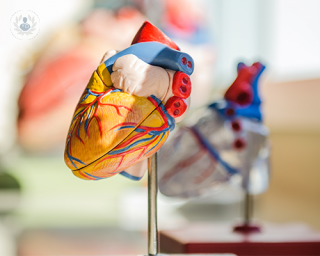

What are abdominal aortic aneurysms?
By Mr Mohamed Abdelhamid
2024-12-26
Learn about the monitoring and treatment of abdominal aortic aneurysm (AAA) from Mr Mohamed Abdelhamid, a leading vascular surgeon and expert in managing AAA. See more


Understanding abdominal aortic aneurysms
By Mr S. Tawqeer Rashid
2024-12-26
In his latest online article, Mr S. Tawqeer Rashid gives us his insights into abdominal aortic aneurysms. He talks about the most common risk factors, the key symptoms, the role of genetic predisposition and the potential long-term complications of an abdominal aortic aneurysm. See more


Aortic aneurysm in the abdomen
By Mr Barun Majumder
2024-12-26
Our blood vessels are very important, carrying blood, oxygen, and nutrients around our bodies to keep us alive. Therefore weak spots on the blood vessel walls known as aneurysms can be a serious problem. But what exactly is an aortic aneurysm? What happens when you have one in your abdomen? Expert Mr Barun Majumder explains. See more


Abdominal aortic aneurysm (AAA): Your questions answered by an expert
By Mr Maziar Mireskandari
2024-12-24
We hear from esteemed vascular surgeon Mr Maziar Mireskandari who shares his expert insight on abdominal aortic aneurysms (AAA) in this informative article. We learn about the causes and symptoms of AAA as well as the impact on the circulatory system. See more
Experts in Aortic aneurysms
-
Professor Alun Davies
Vascular surgeryExpert in:
- Varicose veins
- Deep vein thrombosis (DVT)
- Aortic aneurysms
- Hyperhidrosis
- Venous ulcer
- Carotid endarterectomy
-
Professor Olaf Wendler
Cardiothoracic surgeryExpert in:
- Aortic valve replacement
- Aortic aneurysms
- Aortic stenosis
- Mitral valve repair
- Mitral valve repair (minimally invasive)
- Atrial Fibrillation
-
Mr Obiekezie Agu
SurgeryExpert in:
- Spinal surgery
- Varicose veins
- Endovenous laser treatment (EVLA)
- Aortic aneurysms
- Aortic valve replacement
- Hyperhidrosis
-
Mr Mark Tyrrell
Vascular surgeryExpert in:
- Aortic aneurysms
- Carotid artery disease
- Diabetic foot
- Peripheral arterial disease
- Vascular disease
- Stroke
-
Mr Gary Maytham
Vascular surgeryExpert in:
- Varicose veins
- Peripheral arterial disease
- Aortic aneurysms
- Carotid artery disease
- Diabetic foot
- Lymphoedema
- See all

The Duchy Hospital - part of Circle Health Group
The Duchy Hospital - part of Circle Health Group
Queen's Road, Harrogate HG2 0HF
No existe teléfono en el centro.
By using the telephone number provided by TOP DOCTORS, you automatically agree to let us use your phone number for statistical and commercial purposes. For further information, read our Privacy Policy
Top Doctors

The Outpatients and Diagnostic Centre at 30 Devonshire Street (HCA)
The Outpatients and Diagnostic Centre at 30 Devonshire Street (HCA)
30 Devonshire St, London W1G 6PU
No existe teléfono en el centro.
By using the telephone number provided by TOP DOCTORS, you automatically agree to let us use your phone number for statistical and commercial purposes. For further information, read our Privacy Policy
Top Doctors

The Princess Margaret Hospital - part of Circle Health Group
The Princess Margaret Hospital - part of Circle Health Group
Osborne Rd, Windsor SL4 3SJ
No existe teléfono en el centro.
By using the telephone number provided by TOP DOCTORS, you automatically agree to let us use your phone number for statistical and commercial purposes. For further information, read our Privacy Policy
Top Doctors
-
The Duchy Hospital - part of Circle Health Group
Queen's Road, Harrogate HG2 0HF, HarrogateExpert in:
- Cardiology
- General Surgery
- Plastic surgery, reconstructive and aesthetics
- Diagnostic Imaging
- Ophthalmology
- Otolaryngology
-
The Outpatients and Diagnostic Centre at 30 Devonshire Street (HCA)
30 Devonshire St, London W1G 6PU, Central LondonExpert in:
- Orthopaedic surgery
- Orthopaedic spinal surgery
- Musculoskeletal pain
- Musculoskeletal ultrasound
- Spinal stenosis
- Spinal injections
-
The Princess Margaret Hospital - part of Circle Health Group
Osborne Rd, Windsor SL4 3SJ, WindsorExpert in:
- Brachytherapy
- Cardiology
- General Surgery
- Orthopaedic surgery
- Robotic Surgery
- Dermatology
- See all
- Most viewed diseases, medical tests, and treatments
- Weight loss injections
- Nipple discharge
- Abdominal pain
- Endovenous laser treatment (EVLA)
- Minimal access surgery (keyhole surgery)
- Head and neck cancer
- Neck lump
- Bariatric surgery
- Acellular dermal matrix (ADM)
- Prepectoral breast reconstruction
